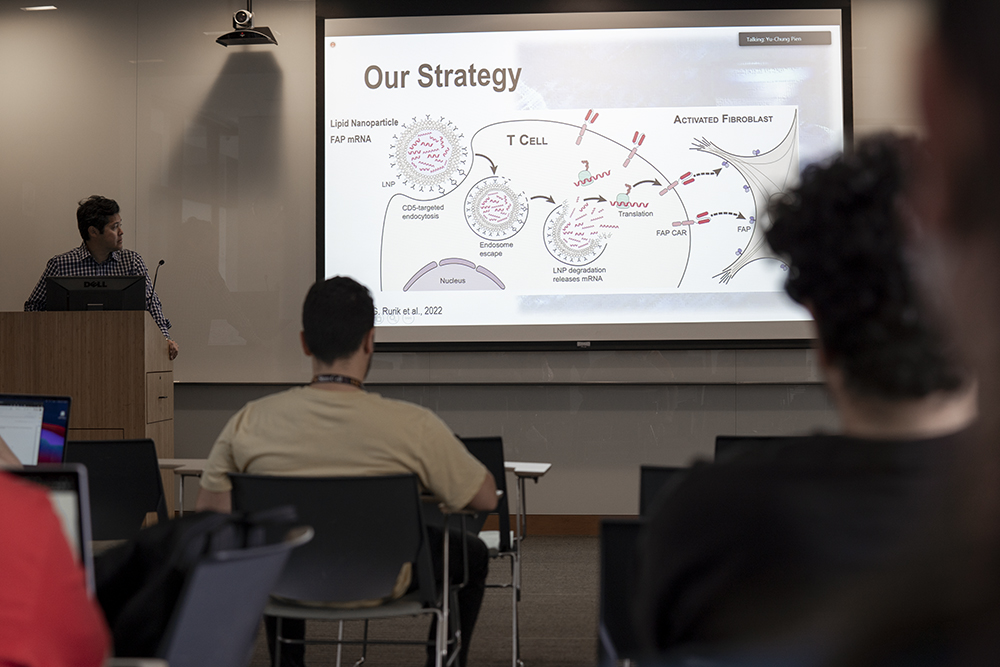
For one scholarship recipient in the master’s program in stem cell biology and regenerative medicine, USC is just close enough to his mother’s house to commute and save on rent. For another, USC is thankfully far enough from her Ukrainian hometown to continue her education in safety. And for all five of this year’s recipients, USC is within reach, in large part, thanks to scholarship support.
“For our students, scholarships often mean the difference between attending or not attending USC,” said Francesca Mariani, faculty director of the master’s program. “By funding scholarships, the Dean’s Office and our generous donors are making a transformative difference in these students’ lives: enabling the best and brightest to further their educations through USC’s one-of-a-kind master’s program in stem cell biology and regenerative medicine.”
Supported by the generosity of an anonymous donor who established the Cardinal Scholarship, and the Office of the Dean of the Keck School of Medicine of USC, the scholarships recognize need as well as academic achievement and community engagement.
SCHOLARSHIPS: How you can make a difference
Broad Scholarship
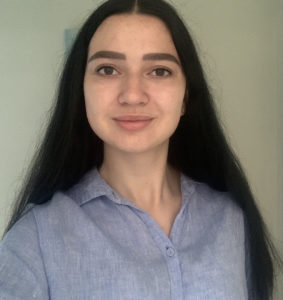
Bohdana-Myroslava Briantseva
A week after boarding an evacuation train out of her native country of Ukraine, Bohdana-Myroslava Briantseva received the news that she had been awarded the Broad Center Scholarship to attend USC’s master’s program in stem cell biology and regenerative medicine.
“As a person who lost everything, I was awarded a chance to have a future,” said Briantseva, who left Ukraine with one spare set of clothes and 120 Euros in her pocket. “Instead of living as a refugee together with my family, I am safe and continue pursuing my education. This scholarship was the only chance for me to start this program. Because of this scholarship, I was able to come to LA where I met the most amazing people in my life.”
Briantseva’s journey to becoming a stem cell scientist began in the small Ukrainian city of Nikopol, where she and her two brothers were raised by her mother. She earned her undergraduate degree in biotechnology and bioengineering at the Taras Shevchenko University of Kyiv, and worked in three research labs at the Institutes of the National Academy of Sciences of Ukraine. Her research projects ranged from studying the physiology of neurons and egg cells, to exploring cancer-causing free radicals, to testing a burn therapy.
“The idea to pursue regenerative medicine appeared when I started working in a laboratory focused on regeneration during my undergrad,” she said. “The research team had invented an experimental stem cell-based drug, which saved the lives of two Ukrainians with burns over 80% of their skin.”
After the Russian invasion of Ukraine, Briantseva’s courses went online, and she began searching for a lab abroad where she could complete the research requirements for her undergraduate degree. She received an offer to perform her four-month required research project at the University of Birmingham in a lab focused on the genomics of cancer, with support from a scholarship from the European Association of Cancer Research. This offer served as her ticket to board an evacuation train to Poland, and from there to travel to the United Kingdom and eventually to the United States.
She sees USC’s stem cell master’s program as an opportunity not only to learn about the scientific side of stem cell science, but also to gain an understanding of the business aspects of preclinical development, technology commercialization, and translational medicine.
As a master’s student, she has also joined Andy McMahon’s lab, where she is studying the role of a gene called Six2 in kidney development and disease. After her graduation from the master’s program, she will continue to work in the McMahon Lab while applying to PhD programs in the U.S.
Her eventual goal is to set up the first research and clinical center for regenerative medicine in Ukraine.
“The greatest lesson I have learned from our history is that strength lies not in the state’s size and capacity, but in the unity of nations and peoples,” she said. “For me, to get an education at USC is the opportunity to establish strong bonds between our countries, to develop linked projects, and to build a shared future of world science.”
Read more about Brianseva’s story in her interview with the European Association of Cancer Research.
Dean’s Fellowship
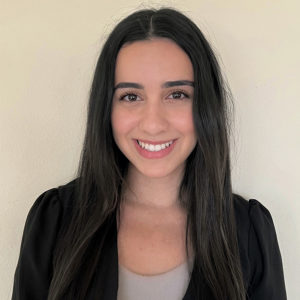
Sarah Ibrahim
Sarah Ibrahim always liked visiting hospitals. Even though the reason for the visit was often distressing, the hospital itself was always fascinating.
“I was so inspired by physicians’ teamwork and dedication to restoring health, and I loved learning about biology, even from a young age,” said Ibrahim, who received the Dean’s Fellowship to pursue her master’s degree in stem cell biology and regenerative medicine at USC, and is currently applying to medical school.
As the daughter of a civil engineer and an electrical engineer who immigrated to the U.S. from Egypt, Ibrahim credits her parents with inspiring her to work hard toward achieving her dreams.
At Canyon High School in Anaheim Hills, she competed in sprints and hurdles on the track team, worked in multiple part-time customer service roles, and volunteered for Access California Services, providing relief to refugees.
At the same time, she continued to cultivate her love of hospitals as a clinical volunteer and lab researcher at Children’s Health of Orange County (CHOC).
“I grew passionate about serving my community and specifically those from disadvantaged backgrounds through volunteering at CHOC and Access, as well as through my customer service roles,” she said.
When she enrolled as a pre-med biological sciences major at the University of California, Irvine (UCI), she was able to continue her involvement at CHOC as a scribe for the departments of endocrinology and emergency medicine. In addition, she worked as a summer intern at CHOC’s Medical Intelligence and Innovation Institute, which provided an introduction to cutting-edge medicine and technology ranging from artificial intelligence to stem cell research.
At UCI, she also joined Marcelo Wood’s lab, studying gene regulation in the context of drug abuse. When students were no longer able to go into the Wood Lab due to COVID-19 restrictions, she shifted to clinical research in Jose E. Abdenur’s metabolism lab at CHOC, where she conducted her own research project while simultaneously working as a CVS Pharmacy tech and as an organic chemistry tutor. She also served as a campus tour guide and representative, providing guidance and mentorship for students from under-represented backgrounds in higher education.
After graduating summa cum laude in three years, she was eager to gain more research experience in USC’s stem cell master’s program.
“There is no way I would rather spend my gap year than by furthering my knowledge and skill set to become the best physician-researcher I can be,” she said. “Receiving this scholarship changed my life and made my dream of pursuing this program during my gap year possible.”
She’s currently applying to medical school, with a strong interest in pediatrics, OB-GYN, and other specialties involving children. In the future, she envisions complementing her clinical practice with research.
“With all the technology and all the new discoveries, the master’s program has given me a more curious mindset, made me think in a more innovative way, and made me more of a problem solver,” she said. “I was talking to one of the doctors here at USC about it, and he said, ‘This master’s program will prepare you to be a 21st century physician.’ ”
Cardinal Scholarships
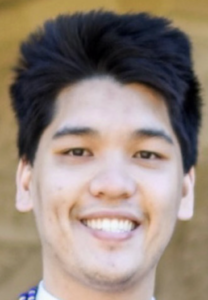
Ambrose Loc Ngo
When Ambrose Loc Ngo learned that he had been awarded a Cardinal Scholarship to attend USC’s master’s program in stem cell biology and regenerative medicine, the very first person he told was his mother.
“My family has faced financial struggles for the majority of my life,” he said. “After receiving notification of this scholarship, I was beyond excited. Not surprisingly, my mother was also beyond happy. Before receiving this scholarship, I was worried about how I would be able to afford tuition. I feel very fortunate to receive this scholarship. Words alone cannot express how grateful I am.”
Ngo’s mother immigrated to the U.S. from Vietnam in her late thirties without speaking English, and raised Ngo and his sisters in the Los Angeles suburb of Reseda, California.
When Ngo was 10 years old, his uncle, who also contributed to supporting their family, passed away from a brain tumor. Two years later, his mother was also diagnosed with a tumor, which didn’t turn out to be malignant and was removed in a successful operation. These experiences inspired Ngo’s interest not only in practicing medicine, but also in helping underserved communities.
“I have always had a strong interest in serving the underprivileged,” he said. “The goal of my career as a physician is to expand access to health care in areas with limited health services.”
Since age 14, Ngo has been volunteering at Valley Presbyterian Hospital, where he helps with everything from monitoring patients to assisting with their discharge.
Ngo earned his associate’s degree from Los Angeles Pierce College in behavioral sciences, and graduated summa cum laude with his bachelor’s degree from UCLA in sociology.
At UCLA, he worked in the Office of Transfer Representatives and initiated research to identify and reduce inequalities for transfer students like himself. He also worked as a student-appointed intern at UCLA’s John Wooden Recreation Center.
He continued his commitment to serving those in need as a volunteer, providing free meals through Project Angel Food Bank, as well as the New Friends Homeless Center.
He also pursued his interests in the medical field by working as an Emergency Medical Technician, performing research about inflammatory bowel disease at in Robert Barrett’s lab at Cedars-Sinai Medical Center, and shadowing an orthopaedic surgeon and a family medicine practitioner.
With the goal of broadening his perspective on medicine, he applied to USC’s stem cell master’s program and was accepted.
After graduation, he plans to apply to medical school to continue pursuing his dreams.
“My ideal career goal,” he said, “is to become a research doctor who specializes in oncology.”
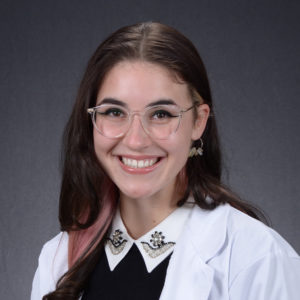
Hailey Pangburn
Can stem cells advance the quest to reduce suicide rates? Hailey Pangburn is asking this challenging question as a recipient of a Cardinal Scholarship and a master’s student in stem cell biology and regenerative medicine at USC.
“Mental health and suicide prevention are my primary focuses when it comes to what I want to research, and a large reason for this is my own mental health struggles,” she said. “A scholarship like this allows me to continue my education with much more ease than before, and I will be forever grateful.”
Pangburn grew up in the Chicago suburb of Dolton, which often made headlines due to its gang-related crime.
“I used to have to duck in the car, because people would be shooting out at the gas station,” she said. “I wasn’t allowed in the front yard, because of the fear of being shot. We lived with my whole family—my grandparents, my great grandparents, all of us—in one house, because we were very poor.”
By the time Pangburn was 10 years old, her family had saved enough money to buy a house in the much safer suburb of Crown Point, Indiana.
She developed her initial interest in neuroscience when her mother, who had epilepsy, brought her along during appointments with the neurologist. This inspired Pangburn to join her high school science club and serve as president of the chemistry club, and to major in neuroscience at Indiana University Bloomington.
As the first in her family to attend college, she completed her bachelor’s degree in three years, while still finding the time to perform research in two labs. In Dan Kennedy’s lab, she used neuroimaging to understand social behavior in the context of autism. In Bryan Yamamoto’s lab, she studied neuronal changes resulting from alcohol and drug abuse. She also served as president of the local chapter of Nu Rho Psi, the National Honors Society in Neuroscience.
Outside the classroom and the lab, she worked with homeless patients with depression and substance abuse issues at the Monroe County Needle Exchange, and received her Certification of Responding to the Addictions Crisis. She also gave a presentation about suicide risk for women with autism at the 55th annual conference of the American Association of Suicidology.
After graduating, she entered the stem cell master’s program at USC. As a master’s student, she joined Michael Bonaguidi’s lab, which studies neural stem cells in aging and disease.
She’s currently in the process of applying to PhD programs. Eventually, she hopes to pursue a career as a faculty member performing research related to neuroscience and pharmacology at an academic institution, and to help develop better interventions to prevent suicide.
“I hope to do suicide research with stem cells,” she said. “I want to focus my future on reducing suicide rates, and I think the skills I will get here will be so valuable for my future moving forward.”
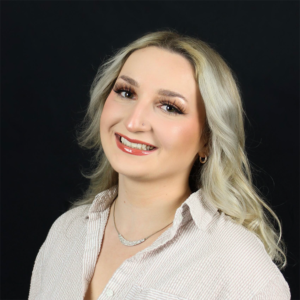
Anastasiia Reipolska
When Anastasiia Reipolska immigrated to Silicon Valley from Kyiv, Ukraine at age five, everything was unfamiliar to her—from the English language to the “Lunchables” in her peers’ lunchboxes.
“I found solace in learning English and being a gifted reader, which led me to love school and learning new subjects and ideas,” said Reipolska, who recently received a Cardinal Scholarship to attend the master’s program in stem cell biology and regenerative medicine at USC. “I carried the power of education, and that opened every single door in my life so far.”
Growing up, Reipolska remained deeply connected to her Ukrainian roots. Throughout grade school, she studied ballet, lyric dance, and figure skating alongside other children whose families had immigrated from Ukraine and Russia. She eventually parlayed this training into a spot on her high school cheerleading team.
As she grew older, she began to notice Silicon Valley’s extreme wealth, which her own recently immigrated family did not yet possess. Reipolska grew up working out of financial necessity, and developed a strong sense of responsibility by serving as a translator for her parents and driving her younger sister to school.
At California State University, Long Beach (CSULB), she majored in molecular and cell biology and physiology, and minored in chemistry. To help cover her tuition, she continued working part-time jobs, including serving as a science tutor at CSULB.
“When you teach someone, you do learn a lot as well, and I did like that aspect of tutoring,” she said. “I also liked helping the students and found that really fulfilling.”
As a scientist, she became passionate about research related to embryology as well as women’s health. She joined Kelly Young’s lab, where she studied how ovaries can regenerate in patients with anorexia and earned a fellowship from the Doris A. Howell Foundation. She had the opportunity to present her research at the annual Society for the Study of Reproduction conference in 2021.
“I found it thrilling to hold my own in front of a crowded conference room, surrounded by distinguished scientists, discussing the results of my data that I wouldn’t have thought so many people would be interested in,” she said. “Even if it is a small corner of the science world, I had the power to motivate change within the research community and help further clinical trials in ovarian diseases.”
She continued on the path to a research career by joining USC’s stem cell master’s program.
“Stem cell research is growing, and the program is one of the only programs that caters to this specific field,” she said. “USC is definitely somewhere I didn’t think I would go, just because of my financial situation and the prestige of the school, so I am very grateful that my financial burden is eased due to the scholarship.”
During the spring semester of the master’s program, she plans to shadow an embryologist working in the lab at an IVF clinic, and to explore jobs in the biotech industry. Eventually, she might pursue a PhD, with the goal of advancing research related to women’s health.
“Science really challenges me like nothing else does,” she said. “I like being challenged, and there’s so much to learn.”
To learn more about how you can support master’s student scholarships, visit https://scrm.usc.edu/support.
